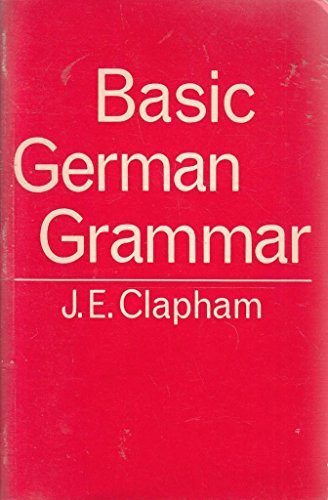

We would not use the alternative word order here as the phrase is too long we only put the preposition at the end when the phrase is short as otherwise the sentence becomes quite hard to follow. On our way to the site, there was a town in which the main square and market were crowded with local people. On our way to the site, there was a town where the main square and market were crowded with local people. When you use 'which' the preposition can be in either position. Note that when you use 'that' you need to put the preposition at the end, not before 'that'. For example:įriday is the day on which I'm most busy.įriday is the day which I'm most busy on.
#German english grammar book pdf plus
Generally speaking, you can replace a relative adverb with a relative pronoun plus an appropriate preposition, not just a relative pronoun. There were some good programmes on the radio, none of which I listened to.Īll of your examples are relative clauses but you have two different grammatical items within them: that/who/which are examples of relative pronouns where/when are examples of relative adverbs. I read three books last week, one of which I really enjoyed. She has three brothers, two of whom are in the army. We often use quantifiers and numbers with relative pronouns: all of which/whom Stratford-upon-Avon is the town where Shakespeare was born.Įngland won the World Cup in 1966. It was the day when the tsunami happened.ĭo you remember the place where we caught the train? We can use when with times and where with places to make it clear which time or place we are talking about:Įngland won the World Cup in 1966. We can't find the chainsaw that we cut all the wood up with. I didn't know the uncle that I inherited the money from. We bought a chainsaw, which we cut all the wood up with.īut when that has a preposition, the preposition always comes at the end: I had an uncle in Germany, who(m) I inherited a bit of money from. We bought a chainsaw, with which we cut up all the wood. I had an uncle in Germany, from who(m) I inherited a bit of money. When who(m) or which have a preposition, the preposition can come at the beginning of the clause: MultipleSelection_MTU4OTM= Relative pronouns with prepositions This is George’s brother, who I went to school with. This is George, who you met at our house last year. This is George’s brother, with whom I went to school. This is George, whom you met at our house last year. We sometimes use whom as the object of a verb or preposition: This is George, whose brother went to school with me. We use whose as the possessive form of who: GapFillDragAndDrop_MTU4OTE= Relative pronouns 4 (NOT We had fish and chips, I always enjoy.)

(NOT Lord Thompson, that is 76, has just retired.) In this kind of relative clause, we cannot use that: With this kind of relative clause, we use commas (,) to separate it from the rest of the sentence. I met Rebecca in town yesterday, which was a nice surprise. We had fish and chips, which I always enjoy. We also use relative clauses to give more information about a person, thing or situation: ( that is the object of built, so we don't need it)Ģ. ( who is the subject of discovered, so we don't need she) Marie Curie is the woman who she discovered radium. The relative pronoun is the subject/object of the relative clause, so we do not repeat the subject/object: GapFillDragAndDrop_MTU4ODQ= Relative pronouns 2 ( that is the object of built) Relative pronouns 1 We can leave out the pronoun if it is the object of the relative clause: In this kind of relative clause, we can use that instead of who or which: Marie Curie is the woman who discovered radium. We use relative clauses to make clear which person or thing we are talking about: Marie Curie is the woman that discovered radium.ġ. Lord Thompson, who is 76, has just retired. Relative clauses tell us more about people and things: We use relative pronouns to introduce relative clauses.


 0 kommentar(er)
0 kommentar(er)
